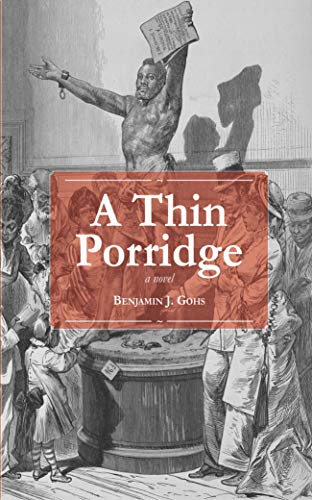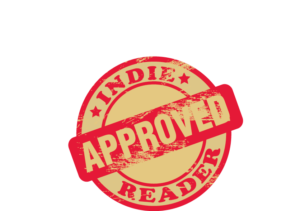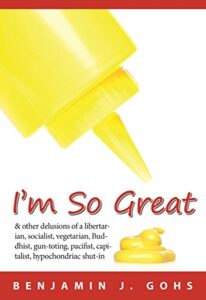A Thin Porridge received a 4+ star review, making it an IndieReader Approved title.
Following find an interview with author Benjamin Gohs.
What is the name of the book and when was it published?
A Thin Porridge – June 15, 2020
What’s the book’s first line?
Dangling from the taffrail above infernal autumn seas, Abeona Browne’s precious seconds comprised of three thoughts: pitiless mitts digging her slender fingers and wrists; silent glide of shark under moonlit murk below; and thrum of life which beat in her ears as had her delicate palms on the African drum she bought the day her father died.
What’s the book about? Give us the pitch.
Death of Abeona Browne’s famed abolitionist father in 1860 sparks a frantic transatlantic adventure as she searches the wilds of Africa for answers to devastating family secrets which threaten the very anti-slavery movement her father helped build.
What inspired you to write the book? A particular person? An event?
While reading Uncle Tom’s Cabin back 10 years or so, I became interested in the history of slavery. Study of American slavery led me back to its origins in Africa, where the practice was often far different—one example being that some African slaves had many human rights that American slaves never enjoyed.
This fascinated me and I wanted to know more. However, while there are many books, movies, and documentaries regarding American slavery, there were far fewer accounts of the African variety.
It was while reading Slavery In Africa: Historical and Anthropological Perspectives, the idea of a story set in the 18th and 19th Centuries and primarily rooted in an African slave’s life story—rather than an African-American slave’s life story—began to blossom.
What’s the main reason someone should really read this book?
To be entertained. While the often-painful subject matter was handled with utmost gravity, and I certainly did my best to make this effort a literary one, A Thin Porridge is, ultimately, an adventure tale written in the spirit of Treasure Island, of Blood Meridian, of The Epic Adventures of Stanley and Livingstone.
What’s the most distinctive thing about the main character? Who-real or fictional-would you say the character reminds you of?
Abeona Browne simply doesn’t give up. While no one comes close to the moxie of L.M. Montgomery’s Anne Shirley, Abeona Browne has a certain amount of what my old mother called “stick-to-itiveness” which, in addition to her compassion for others, is her greatest asset.
If they made your book into a movie, who would you like to see play the main character(s)?
If I had a time machine, I’d say Abeona Browne should be played by Whoopi Goldberg circa The Color Purple. She’s the picture in my mind when I think of Abeona. But I think Janelle Monáe could do a very nice job with this part.
As for the old English lawyer Terrence Swifte, John Hurt would have been the best. It’s his voice I heard when I wrote. But, since he’s gone, perhaps Ciarán Hinds could make a go of it. I know, I know, he’s Irish. But I’d be willing to make the change for the (cough cough) Netflix limited series.
Djimon should hands-down be played by Pooch Hall. He’s got the onscreen toughness, humor, and dramatic chops that would make him perfect for the part.
My favorite ghastly rogue in A Thin Porridge looks most like (sincere apologies here) Dr. Cornel West—primarily a writer and teacher but whom I recently saw in a small movie role. Perhaps he could be convinced.
When did you first decide to become an author?
In 1998, I began jotting some old humorous and horrible family stories for my brother Adam. Just to make him laugh. And cringe. A year later, I had a 120,000-word memoir that will never see the light of day, but which turned me on creatively. I guess 1999 was the year I knew I was supposed to be a writer.
Is this the first book you’ve written?
While I put together two nonfiction books of humor essays (Frickin 40: Funny Stories About Middle Age and I’m So Great & Other Delusions) and penned a philosophy tome, I didn’t get serious about the novel until 2013, when the idea for A Thin Porridge arrived. Problem was, I knew I wasn’t ready to attempt a story of such magnitude. Hell, I wasn’t even sure I could finish a fiction book. So, I wrote a practice novel. What resulted was a not-too-bad but not-too-good mishmash of Dan Browne and Stephen King. It took me the better part of a year, but I finished the sucker!
Armed with the teensiest bit of confidence, I began sketching ideas, scene notes, chunks of dialog, and character descriptions in my hopeful little notebook. In the six years since I began A Thin Porridge in earnest, I’ve completed three more novels. Technically, A Thin Porridge is my second. But you could also say it’s my fifth.
What do you do for work when you’re not writing?
Editor of the community newspaper I co-founded in 2009.
How much time do you generally spend on your writing?
Monday afternoons, most of Tuesdays and Wednesdays, and little bits here and there as my job allows.
What’s the best and the hardest part of being an indie?
My favorite aspect of going it alone is the creative freedom. Sure, I rely on test readers, copy editors, and story consultants, but if I want to go a certain direction, I may. Sometimes at my own peril.
Difficulty with this arrangement is the marketing. Indie authors can, mostly, only squeak about their books in an industry which rewards screamers. The other worst part is not having an agent. Just once I’d like to be able to say, “I would love to hear about your cat’s hernia surgery, but my agent’s calling.” Maybe I will anyway, just for fun.
What’s a great piece of advice that you can share with fellow indie authors?
Advice is nice but you’ve got to figure your writing life out for yourself. No cadre of muses, gurus, or hucksters hawking unbreakable rules is going to help you discover when-where-how to do the work. Because that’s what it is—work.
Would you go traditional if a publisher came calling? If so, why?
Maybe. I see an awful lot of authors whose books get deals, everywhere from micro-publishers on up to the big houses, and then seem to fall off the face of the Earth. What did they get for signing away most of the rights to their creative endeavor? A few thousand bucks up front isn’t worth handing over control of something I worked so hard on … unless there was some realistic hope of reaching a large audience.
Is there something in particular that motivates you (fame? fortune?)
Readers. You can keep all of the fame and most of the money. I want more than anything else to connect with people in a meaningful way. How else can you share your soul with someone—telepathically speaking.
Which writer, living or dead, do you most admire?
Sorry but it’s a three-way tie between Cormack McCarthy, Annie Proulx, and Charles Bukowski. A rather motley threesome, I know.
Which book do you wish you could have written?
The Shipping News. Poor pathetic lovable Quoyle.


